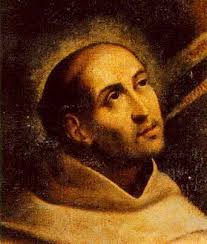 There are any number of reasons for reposting this wonderful statement of spiritual yearning from St. John of the Cross, especially at this time of year.
There are any number of reasons for reposting this wonderful statement of spiritual yearning from St. John of the Cross, especially at this time of year.
But I post it to accompany the Arcturian Group’s mention of the “dark night of the soul,” (1) which term St. John originated. St. John refers to his “dark night,” in passing, here:
Without a foothold you must seek Him out-
no face nor form, alone –
tasting there something I dont know
that one may come on randomly.
For All the Beauty There May Be
From Willis Barnstone, trans., The Poems of Saint John of the Cross. New York: New Directions, 1972; c1968.
For all the beauty there may be
Ill never throw away my soul;
only for something I dont know
that one may come on randomly.
In savoring a finite joy
the very most one can expect
is to enfeeble and destroy our taste,
leaving the palate wrecked;
for all the sweetness there may be
Ill never throw away my soul;
only for something I dont know
that one may come on randomly.
A generous heart will never care
to go part way;
it wont be cowed
if there is passage anywhere,
but set out on the hardest road;
nothing can cause it misery,
and with faith soaring like a cloud
it feeds on something I dont know
that one may come on randomly.
One who suffers the pains of love
from contact with the holy being
will find himself abandoning old tastes
and killing remnants of all taste-
like one who feverishly rejects the food he sees,
although he longs for something I dont know
that he may come on randomly.
Dont be surprised by all of this,
and let your taste remain as dead
for it will lead you to a bed of evil
far from any bliss;
For every living being is seen to be
relentlessly alone
and feeds on something I dont know
that he may come on randomly.
And once the will has felt
the mark of the divinity,
it cannot be repaid by any man;
only the Lord can heal the dark;
His beauty is of such degree
as to be seen through faith alone,
tasted in something I dont know
that one may come on randomly·
With such a lover as the Lord
tell me if you will be in pain,
for His love is devoid of taste
among the things made in this world.
Without a foothold you must seek Him out-
no face nor form, alone –
tasting there something I dont know
that one may come on randomly.
And dont look to your inner eye
(though of a vastly greater worth)
to find among the joys of earth
happiness and ecstasy;
more than all beauty there may be
or may have been or can be now,
one feeds on something I dont know
that one may come on randomly·
Whoever cares to do his best
should look for what may still be gained,
not what already is obtained,
and he will see the higher crest.
And so to reach the utmost peak
I always shall be moved
to go largely to something I dont know
that one may come on randomly.
On earth you never must rely
on what the senses understand
or all the knowledge you command,
although it rises very high.
No grace nor beauty there may be
will make me throw away my soul;
only for something I don’t know
that one may come on randomly.
Footnotes
(1) “Every soul eventually comes to an inner place devoid of everything previously dependable and depended upon. This is the ‘dark night of the soul’ and can last for some time. The Christ can never be born into a consciousness that is already filled with three-dimensional beliefs and this phase of the journey is represented by ‘no room at the inn.'” (Arcturian Group through Marlyn Raffaele, Dec. 20, 2020, at https://goldenageofgaia.com/?p=315803.)
Just to clarify: St. John did not mean by the term a really rough time. As the Arcturian Group indicates (above), he meant a time devoid of senses, alone, without foothold of any kind, as Bernadette Roberts describes (below):
“In experience, the onset of this process (of God-realization) is the descent of the cloud of unknowing, which, because his former light has gone out and left him in darkness, the contemplative initially interprets as the divine gone into hiding. In modern terms, the descent of the cloud is actually the falling away of the ego-center, which leaves us looking into a dark hole, a void or empty space in ourselves. Without the veil of the ego-center, we do not recognize the divine; it is not as we thought if should be. … [Without a foothold you must seek Him out-/no face nor form, alone]
“From here on we must feel our way in the dark, and the special eye that allows us to see in the dark opens up at this time [tasting there something I dont know/that one may come on randomly]. (Bernadette Roberts, “The Path to No-Self” in Stephan Bodian, ed. Timeless Visions, Healing Voices. Freedom, CA: Crossing Press, 1991, 131.)

